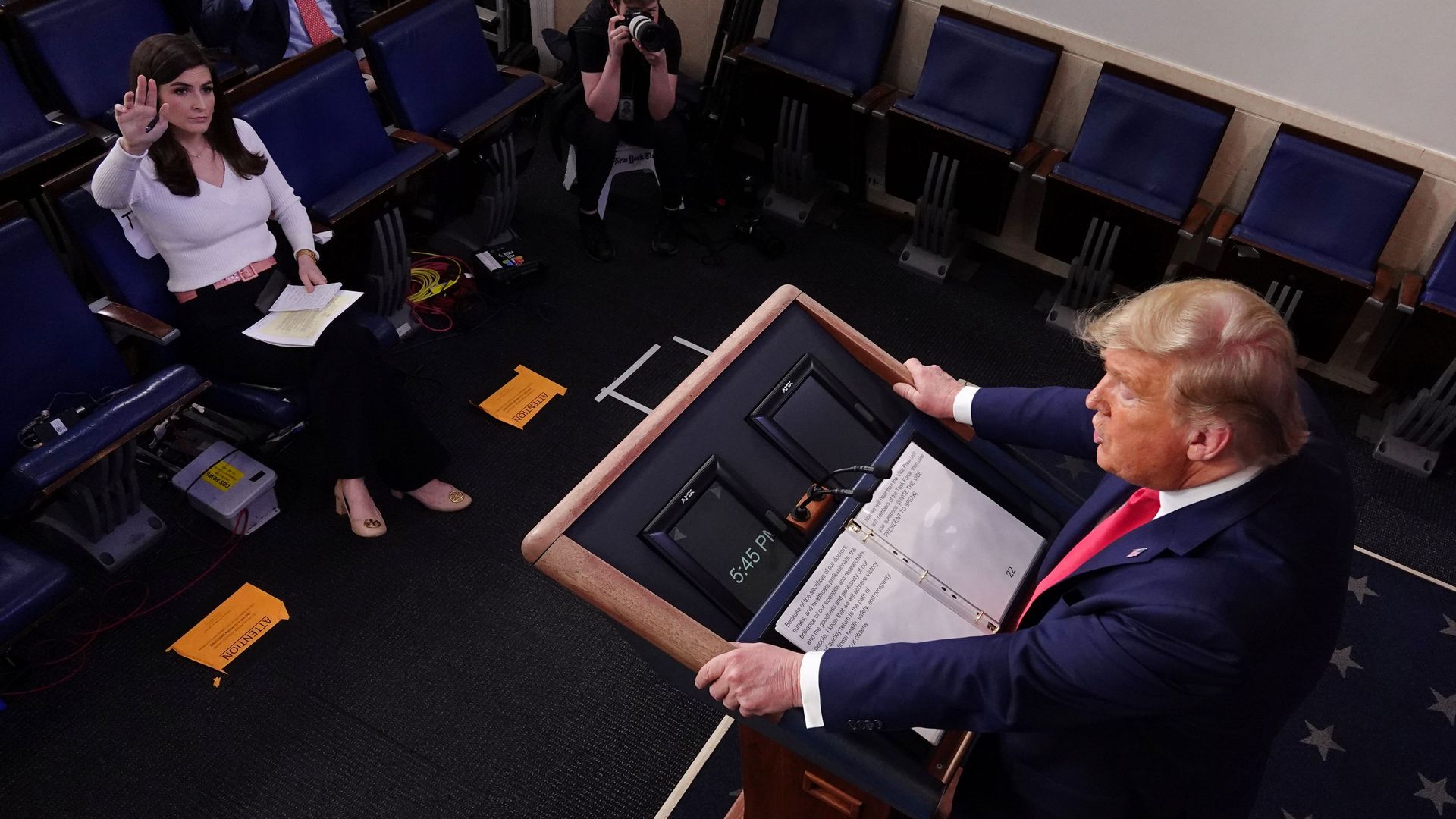Advisers steer Trump to drop back-to-work deadline
Add Axios as your preferred source to
see more of our stories on Google.

CNN’s Kaitlan Collins in the socially distanced White House briefing room. Photo: Jonathan Ernst/Reuters
Believing the worst is yet to come, some top advisers to President Trump are struggling to steer him away from Easter as an arbitrary deadline for much of the nation to reopen.
State of play: The operating assumption among administration officials involved in the coronavirus planning is that the April 12 mark — 16 days away — will not, in fact, turn out to be the starting gun for businesses across America to reopen.
- But Trump is far from chastened. "I don’t think he feels in any way that his messaging was off," a top official said. "He feels more convinced than ever that America needs to get back to work."
One person close to Trump expressed concern about market reaction the day after Easter, if the president allows that to be set up too rigidly as Open Day.
- If the reality is worse than Trump hopes — and large numbers of Americans have to stay isolated — some close to Trump think a false Easter expectation could send markets downward.
Between the lines: The reality is that the administration is unlikely to go from red light to green light.
- More likely it’s a step-by-step process — a "tiered" approach, different guidelines based on geography and other factors, as Trump has been foreshadowing.
- Trump sought yesterday to provide himself more flexibility, given internal expectations that awful data will only mount.
- Dr. Anthony Fauci said on CNN last night that Easter was Trump's "aspirational projection" to "give people some hope." But Fauci said Trump is "listening to us when we say we really got to reevaluate it, in real time, and any decision we make has to be based on the data."
Weaning Trump from setting a date for millions of Americans to get back to work is a delicate, ongoing process.
- Final options haven't been presented to Trump, as officials await more data.
- Aides plan to continue finalizing recommendations right up to expected weekend meetings with the president.
What's next: Despite the blowback for imposing an unrealistic and artificial deadline on a virus that knows no deadline, Trump remains impatient.
- On Monday, he faces his first self-imposed deadline — the end of the White House's "15 days to slow the spread."
- Some senior administration officials said they wish they could ignore it, because they need more time for societal isolation to catch up to the virus.
- But the White House’s decision to relentlessly brand that 15-day period means Trump will have to address it somehow.
Behind the scenes: Advisers have tried to encourage Trump to offer hope without dates or deadlines — to get him away from offering dates and to find new ways to be optimistic without giving the public a false expectation that an end to the crisis is near.
- Aides have discussed using other benchmarks to give the public a sense that the coronavirus shut-in won’t go on forever.
- They've talked about getting past the peak of transmissions, then gradually loosening restrictions as cases trend downward.
Trump has already signaled the direction he wants to go: He wants states to pursue their own policies, depending on their level of risk.
- He's encouraged by states like Alabama and Mississippi keeping many businesses open, and sticking to fairly basic measures like hand washing and social distancing.
- Trump accepts that other states like New York will likely stay shut down.
The bottom line: A senior White House official said the administration is having trouble offering anything approaching certainty.
- With states including Louisiana and Florida showing increasingly alarming signals, there’s a sense that a rolling disaster awaits.
Subscribe to Mike Allen's Axios AM to follow our coronavirus coverage each morning from your inbox.
